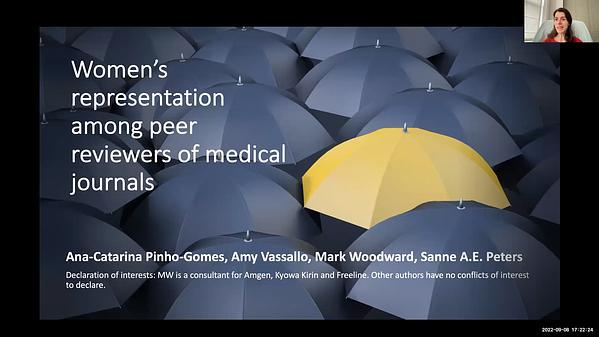Would you like to see your presentation here, made available to a global audience of researchers?
Add your own presentation or have us affordably record your next conference.
keywords:
errors and corrections
retractions
misconduct
Objective Retracted clinical trials may be
influential in systematic reviews and
guidelines. Fanelli et al 1 examined the impact of
retractions on 50 meta-analyses and found
little influence but suggested that the impact
was likely variable and context specific. Using
retracted clinical trial reports from one
research group, 2 responses of editors and
authors to notifications that systematic reviews
and guidelines they had published had cited
the retracted trials were evaluated.
Design Between November 2019 and January
2020, for 27 retracted trials (published 1997 to
2012, retracted 2016 to 2019) in osteoporosis
and neurology, searches were conducted in
Web of Science, Scopus, and researchers’ files
for systematic reviews and clinical guidelines
that cited the trials as evidence. Citing
publications that acknowledged that they had
cited retracted work were excluded. For each
citing publication, 2 researchers independently
coded the likely impact of removing the
retracted trial reports, including findings likely
to change (yes, no, or uncertain) and size of change
(substantial, moderate, or minor). In a factorial design with 4
groups, authors of citing publications were randomized to
receive up to 3 emails (if no reply) to the contact author and
journal editor vs contact author only and, for citing
publications with 2 or more authors, to an email to the
contact author only vs up to 3 authors (selected from among
contact, first, second, and final authors). Emails giving details
of the retracted trials were sent monthly September to
October 2020. Follow-up was 1 year for outcomes, assessed
by replies to emails and notices in the public domain,
including any reply (yes or no), time for a reply from first
author, time for any reply, and action taken. Comparisons
were undertaken using χ² tests. Email replies were analyzed
for content by 3 researchers.
Results A total of 88 citing publications (published 2003 to 2020) were identified; 2 were corrected before emails were sent. Authors/editors were emailed about 86 citing publications. A total of 45 of 88 citing publications (51%) had findings coded likely to change if the retracted trials were removed, and 39 of these (87%) were likely substantial impacts. Replies were received for 44 of 86 citing publications (51%). Emailing 3 authors was more likely to elicit a reply than emailing the contact author alone (26 of 42 62% vs 16 of 40 40%; P = .03), but including the editor did not increase replies (23 of 44 52% with editor vs 21 of 44 48% without editor; P = .66). Including more authors and/or the editor, whether findings were coded likely to change and the size of the likely change, had no effect on published corrective action. One year after emails were sent, only 9 publications had been corrected.
Conclusions Retracted trials impact systematic reviews and guidelines. Emailing more authors to notify them of the retractions yielded more replies but did not increase corrections. Email alerts to authors and editors are inadequate to correct the impact of retracted publications in citing systematic reviews and guidelines. Publications with retracted citations should be marked until authors resolve concerns.
References
1. Fanelli D, Wong J, Moher D. What difference might retractions make? an estimate of the potential epistemic cost of retractions on meta-analyses. Account Res. Published online July 14, 2021. doi:10.1080/08989621.2021.1947810
2. Bolland MJ, Avenell A, Gamble GD, Grey A. Systematic review and statistical analysis of the integrity of 33 randomized controlled trials. Neurology. Published online November 9, 2016. doi:10.1212/WNL.0000000000003387
Conflict of Interest Disclosures None reported.
Funding/Support Mark J. Bolland is the recipient of an HRC Clinical Practitioner Fellowship. The Health Services Research Unit is funded by the Chief Scientist Office of the Scottish Government Health and Social Care Directorates.


